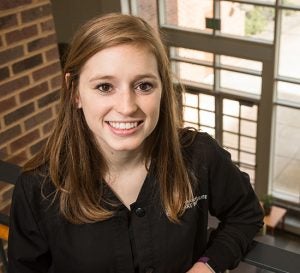NEW NURSES
ECU ensures healthy outcomes by educating NC’s future workforce
North Carolina’s need for more nurses is clear: the state’s elderly population is expected to double by 2020, and one in five nurses is nearing retirement age. But with those factors stressing the health care system, the need is for more than just nurses – but for more nurses educated at higher levels.
“Research relates improved patient outcomes with nurses who have the four-year baccalaureate degree or higher,” explained East Carolina University College of Nursing Dean Dr. Sylvia Brown.
About 50 percent of N.C.’s current nursing workforce is prepared at the baccalaureate or graduate degree level – far short of the North Carolina Future of Nursing Action Coalition’s goal of 80 percent. The remainder have a two-year associate degree in nursing. ECU produces more new nurses with baccalaureate degrees than any other program in the state, and is further answering the call to elevate the education of the state’s nurses with its RIBN, or Regionally Increasing Baccalaureate Nurses, program.
Coordinated statewide by the nonprofit Foundation for Nursing Excellence, RIBN is an example of what can happen with an emphasis on accessibility and affordability for nursing students. It’s a partnership with six eastern North Carolina community colleges that enables students to first earn an associate degree in nursing at a participating community college and transition to complete their bachelor of science in nursing, or BSN, online at ECU. Once students complete their associate degree and pass the state licensure exam at the end of their third year, they are able to begin working as nurses while they take the required online BSN coursework at ECU.
This May, the program’s first class of five graduates earned their BSN at ECU. All five graduates have secured jobs — working in the positions they began as students in the RIBN program. Another 105 students are currently enrolled in the RIBN program at various stages.
The program allowed RIBN graduate Morgan Dawson of Winterville to follow in the footsteps of her mother, who is also a nurse. She says the program gave her the valuable hands-on experience she needed to pursue her career of choice.

ECU graduate Morgan Dawson is one of five RIBN students to complete baccalaureate coursework this spring. (Photo by Cliff Hollis)
“This program allows us to work to address the nursing shortage currently going on and to begin our full-time careers a full year earlier than a strictly BSN nursing program,” said Dawson, who has worked in the cardiac intensive care unit at Vidant Medical Center since graduating with an associate degree from Pitt Community College in June 2015.
The dual-enrollment model makes a BSN more affordable and accessible by lowering costs for both tuition and housing. The transition from the community college into ECU’s BSN program is seamless, as students are automatically accepted into both the nursing program at the community college and at ECU when they enroll in RIBN.
“I wanted to stay at home to save money and going to Beaufort Community College I could commute because it was only 30 minutes away,” said Caleb Woolard, a RIBN graduate and Williamston native.
“The RIBN program allowed me to form a family with other nurses and to not only obtain two degrees in four years, but also work while obtaining my second degree – which is good because it gives you experience that helps you with your BSN courses.”
Woolard is working in the cardiovascular intermediate unit at Vidant Medical Center, and said he will consider returning to school one day to become a nurse anesthetist. His mother, Mary Griffin ’85, is an ECU College of Nursing graduate, too.
Participants also get the support of a student success advocate, whose role is to help RIBN students navigate any academic challenges they may face.
“Our program has grown and it’s because of your success,” remarked that advocate, Kelly Cleaton, at a commencement reception for the RIBN group on May 6. “People have seen how well you’ve done in school and out in the community at work. We’re just so proud of you.”
By contributing nurses like Dawson and Woolard to the workforce, ECU is a leader for the state, says Polly Johnson, chief executive officer of the Foundation for Nursing Excellence.
“ECU is helping to lead the way in addressing critical health care challenges facing North Carolina,” she said, “and is doing so by graduating nurses who are prepared to be critical thinkers and leaders for our communities.”
